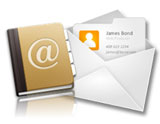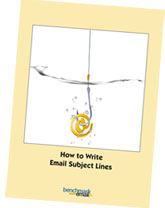Step 3 - Ethically Compile Your List

Barack Obama's email list is worth half a billion dollars, so if you ever needed proof that email marketing works you can look to the President's online promotions success. You don't have to reside in the White House to build a profitable
email marketing list: All it takes is some common sense, dedication and a firm commitment to never stray into unethical practices such as sending emails promoting your latest book or other literary work to people who have not granted you formal permission to do so.
Shun Indiscriminate Email Blasting
When author Michelle Dunn was launching a second edition of one of her books on credit and collections, she made a comprehensive list of whoever had purchased her first edition as well as various credit managers and collectors she had previous contact with and knew were interested in her topics. There is nothing unethical or illegal in contacting individuals you have had previous personal or business contact with to inform them that you have a new book out. The line is crossed when you email someone you've never had any contact with previously, as that opens the door to indiscriminate email blasting. Always follow
permission based email marketing practices.
There Is No "Book Everyone Will Want to Read"

Xlibris will actually send out an email featuring your book to ten million "book lovers and reading enthusiasts across the world" for a mere $10,000. How they obtained permission from these individuals is essentially not your concern as they're the ones sending out the email, but you have to ask yourself in today's highly fragmented and oversaturated publishing market what the value is in sending a book promotion to "reading enthusiasts." Will the habitual reader of bodice-ripping romance novels be interested in a DIY guide to fixing your own plumbing, or will the motorcycle racing enthusiast want to read about how to quilt a Little Dutch Girl? There is no such thing as a "book everyone will want to read" in the 21st century, so readers must be targeted according to how their previously expressed behavioral preferences dovetail with the subject matter of your book.
Be Sensitive when Emailing Reviewers & Journalists
There is a gray area in
email marketing best practices when it comes to targeted promotion. As long as there is a clearly prominent unsubscribe facility that is immediately honored, it would not be generally considered a "commercial solicitation" to contact book reviewers and members of the press by email. Sensitivity is a prime prerequisite, as it could be considered spam to send a solicitation for coverage of a children's book to Car & Driver magazine, or ask for a review for your casino guide from a chick lit reviewer. When emailing your promotions you have to honestly answer the question of "would this individual be genuinely interested in this book?" before sending anything.
Buying Email Lists Is Fraught with Problems
Horizontal media such as the major newspapers, magazines and television networks are effectively impregnable due to the volume they receive. The New York Times receives an average of three emailed press releases per minute 24/7, so you have to ask yourself if there is any real value in your adding to that largely unread pile. However, targeting reporters, bloggers and book reviewers working in smaller "more approachable" vectors by purchasing a list of media contacts is fraught with problems. The Bacon/Cision and Vocus Media Databases are examples of lists from a reputable publishers that contain countless journalistic contacts who never agreed to be listed and are now being unmercifully spammed by the ravenously publicity-hungry. Lifehacker founder Gina Trapani even went as far as compiling a list of PR oversenders in Gmail filtering format for one-click defusing by other journalists.
Preserve Your Email Sending Reputation

You have to be vividly aware of the mechanism of spam reporting and how it can affect your book promotions. When you send an email missive to a reporter, blogger or reviewer and that individual chooses to list that message as spam, your "email sending reputation" takes a hit. Enough hits and the Internet Service Providers (ISPs) that route traffic up and down the internet will add you to a blacklist and you'll have trouble getting an email to your granny, let alone to the press at large. To ensure that your spam reports are kept to a minimum, be explicitly clear in the subject line and
preheader as to what the content deals with. If you're soliciting a review for your book on Napoleon's youthful days in Ajaccio from a reviewer for History Today magazine, make sure that the email is clearly identified as such so that they don't think you're pitching them a dessert cookbook on baking cream-filled Napoleons.